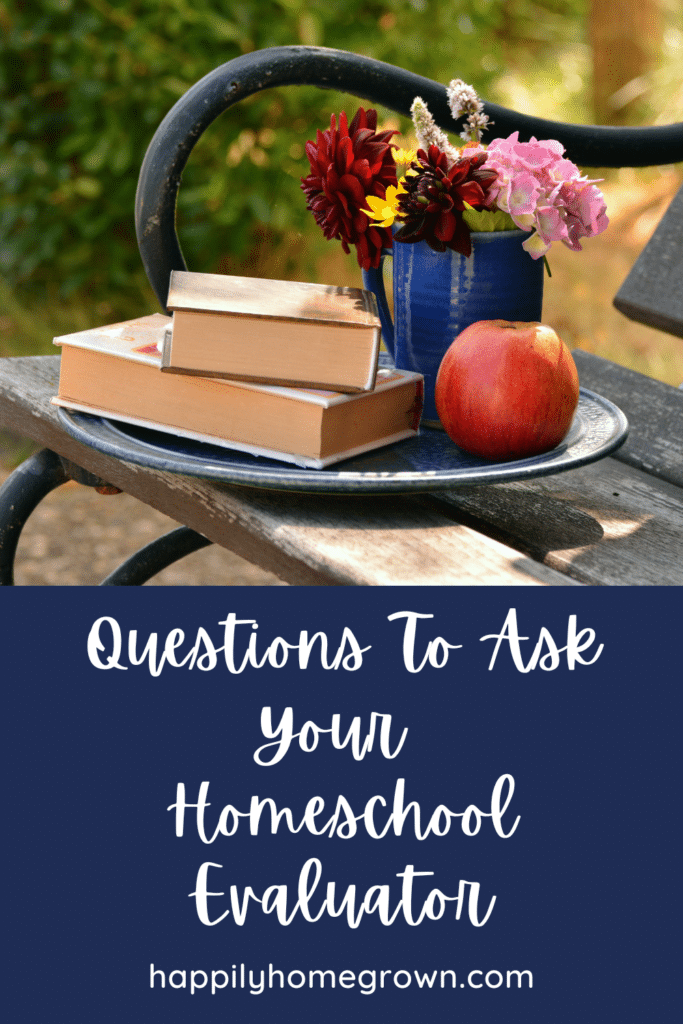Posts on Happily Homegrown contain affiliate links. When you make a purchase through an affiliate link, your price will be the same, but Happily Homegrown will receive a small commission. Thank you for your support!
Selecting a homeschool evaluator can be a daunting process. Here are some interview questions to help determine if a particular evaluator is a good fit for your family.

Not all evaluators come from the same background. Some have classroom teaching experience. Others do not. It is important to chat with your potential evaluator before you commit to working with them. You and your child need to be comfortable with your evaluator.
I have been a homeschooler and homeschool evaluator for over seven years now. I enjoy meeting new families each year and reconnecting with others year after year. I’ve been the evaluator but I’ve also hired evaluators to work with my family.
What does a homeschool evaluator do in Pennsylvania?
According to Pennsylvania Home Education Law, students must have an evaluation each year. The evaluator, who works for the supervisor of the home education program (typically a parent), will review the student’s homeschool portfolio and interview the student and the supervisor. They will make sure that the required subjects have been covered, that a book log is included, and that if standardized testing is required (grades 3, 5, and 8) the scores are included.
An evaluator doesn’t determine whether your child passes or fails the school year. An evaluator doesn’t say your child is gifted, or advanced, or behind. They don’t determine what grade level your child is in. And they don’t get to tell you how to homeschool your child. They only determine if you have followed the law and if the student has made progress in the program.
General Questions to Ask Your Homeschool Evaluator
- Are you accepting new families for the current school year?
- When does your calendar open for evaluations?
- Where do you do evaluations?
- How much do you charge for evaluations? Is there a discount for siblings?
- What is the best way for us to communicate?
Questions to get to know your potential homeschool evaluator
Are you a homeschooler?
Not all homeschool evaluators are also homeschoolers. Since 2021, there has been an influx of people who are evaluators just as a side hustle and they don’t know much about homeschooling. Even if your chosen evaluator isn’t a homeschool parent, make sure they are familiar with homeschool law (which means you need to be familiar with the law too).
Are you familiar with our curriculum?
While not being familiar with a curriculum isn’t a deal breaker, the way someone responds may be. If you are using a curriculum and your potential evaluator bashes it right away then maybe they aren’t the best person to be evaluating your children.
Are you familiar with our homeschooling style?
You may want to know if your evaluator is familiar with unschooling, eclectic homeschooling, classical homeschooling, etc. Again, this is not necessarily a deal breaker, but listen to how they talk about their homeschooling philosophy and how they can support yours. For example, if you have someone who says that learning can only happen with a formal textbook, but you are an unschooler or eclectic homeschooler, you may need to ask some follow-up questions to determine if they are a good fit.
Can I reach out to you with questions throughout the year?
Some evaluators only offer end-of-year evaluations. Others offer more support during the year and are willing to respond to emails throughout the year. Some evaluators will keep in touch via a Facebook group or over email with no additional fee, but if you need regular phone calls there may be a consultant fee. Both of you need to be clear with your expectations from the beginning.
Do you offer any other services?
I’ve met evaluators who offer tutoring and private lessons. Some offer standardized testing. Others offer transcript services and college coaching. There are so many potential services and supports that an evaluator can offer. Find out what they bring to the table and what makes them stand out. These connections can help you and your students in the future.





Leave a Reply